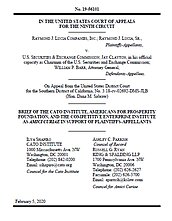Learn more about Cato’s Amicus Briefs Program.
How many unconstitutional administrative trials must one endure before getting the chance to argue your case in an Article III court? According to the U.S. Securities and Exchange Commission, the answer is at least two.
Raymond Lucia already put up with one unconstitutional agency adjudication. In 2012, the SEC charged Lucia, a financial adviser boasting a sterling record, with “fraud” based on a novel legal theory. The SEC could have brought the case to federal court, where defendants enjoy discovery rights and evidentiary protections. Instead, the SEC tried Lucia in-house, where there are no such guarantees, and his case was assigned to an administrative law judge who bragged about never ruling against the government. Ultimately, the SEC imposed severe penalties on Lucia, including steep fines and a lifetime ban from his chosen profession.
Lucia challenged the agency’s order in federal court, arguing that he’d been the subject of an unconstitutional proceeding. Specifically, he argued that SEC’s administrative law judges are “inferior officers” who had not been appointed by the “President alone…Courts of Law, or…Heads of Departments” as required by the Constitution. After the D.C. Circuit deadlocked over his case, Lucia successfully petitioned for Supreme Court review. Cato filed briefs supporting Lucia’s cert petition and then on the merits.
In 2018, the Court held in Lucia’s favor and invalidated his SEC proceeding. To comply with the Court’s order, the SEC “ratified” its administrative law judges’ prior appointments. But the SEC’s Appointments Clause “solution” brought about a separate constitutional violation involving the removal of these same officials. As a matter of constitutional law, the agency jumped from the frying pan right into the fire.
Under the Court’s precedent, the Constitution does not permit Congress to design a regulatory agency with two or more “layers” of officers who cannot be fired “at will” by the president. Yet SEC judges are “officers” with not two but three layers of tenure protection. SEC judges cannot be fired at will (layer one); instead, they are removable at the behest of tenured SEC commissioners (layer two) after a trial by the Merit Systems Protection Board (layer three). This triple insulation contravenes the Court’s current interpretation of the Constitution’s structure.
Now the SEC is trying to force Lucia to participate in another unconstitutional agency adjudication, with all the associated expense and inconvenience. Enough is enough. With the help of the New Civil Liberties Alliance, Lucia filed suit against the SEC in a federal district court in California. All he seeks is his day in a court that passes constitutional muster.
On August 21, 2019, the district court dismissed Lucia’s case for lack of subject‐matter jurisdiction, concluding that Congress intended to preclude district court purview over Lucia’s constitutional claims and channel those claims through an administrative process. Lucia has appealed the district court’s order to the Ninth Circuit.
Cato, joined by the Cause of Action Institute and Competitive Enterprise Institute, today filed a brief in his support. We argue that the district court misconstrued (and thereby trivialized) a serious ongoing constitutional injury, for which Lucia may never get any opportunity to seek or obtain redress. Because this case alleges a colorable constitutional claim of ongoing ultra vires government action, and because Congress cannot have intended to strip district courts of jurisdiction over such a claim, the Ninth Circuit should allow Lucia’s case to proceed in federal court.
For more background on this case, see Cato’s briefs in Lucia v. SEC and Free Enterprise Fund v. PCAOB.

This work is licensed under a Creative Commons Attribution-NonCommercial-ShareAlike 4.0 International License.
